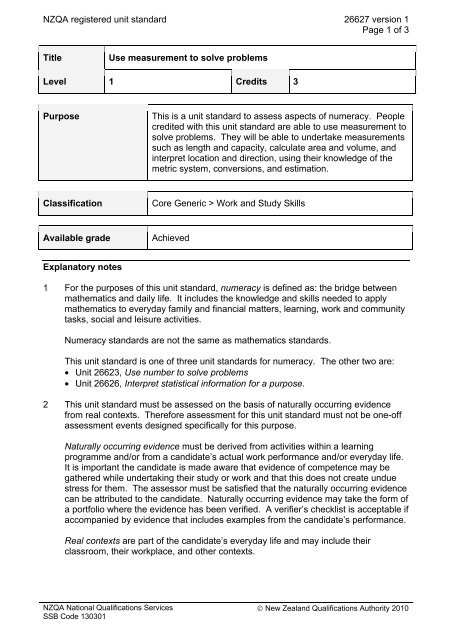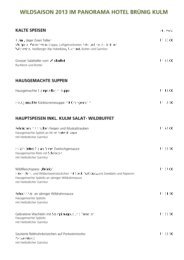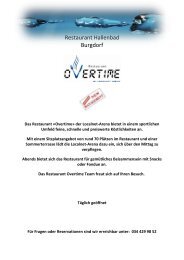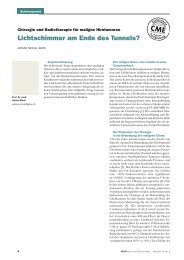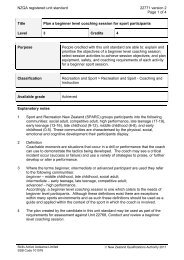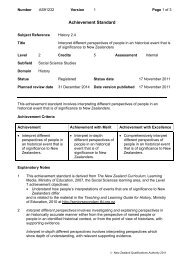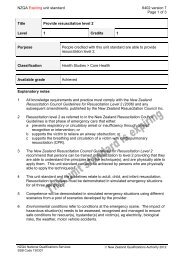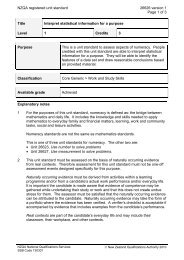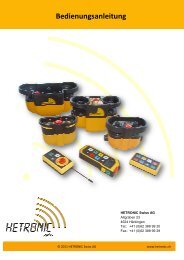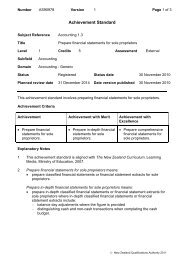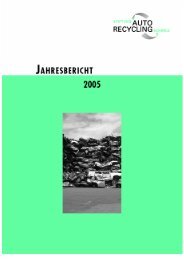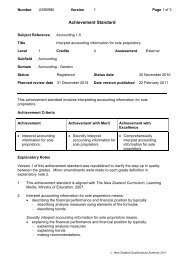NZQA registered unit standard 26627 version 1 Page 1 of 3 Title ...
NZQA registered unit standard 26627 version 1 Page 1 of 3 Title ...
NZQA registered unit standard 26627 version 1 Page 1 of 3 Title ...
Create successful ePaper yourself
Turn your PDF publications into a flip-book with our unique Google optimized e-Paper software.
<strong>NZQA</strong> <strong>registered</strong> <strong>unit</strong> <strong>standard</strong> <strong>26627</strong> <strong>version</strong> 1<strong>Page</strong> 1 <strong>of</strong> 3<strong>Title</strong>Use measurement to solve problemsLevel 1 Credits 3PurposeThis is a <strong>unit</strong> <strong>standard</strong> to assess aspects <strong>of</strong> numeracy. Peoplecredited with this <strong>unit</strong> <strong>standard</strong> are able to use measurement tosolve problems. They will be able to undertake measurementssuch as length and capacity, calculate area and volume, andinterpret location and direction, using their knowledge <strong>of</strong> themetric system, con<strong>version</strong>s, and estimation.ClassificationCore Generic > Work and Study SkillsAvailable gradeAchievedExplanatory notes1 For the purposes <strong>of</strong> this <strong>unit</strong> <strong>standard</strong>, numeracy is defined as: the bridge betweenmathematics and daily life. It includes the knowledge and skills needed to applymathematics to everyday family and financial matters, learning, work and comm<strong>unit</strong>ytasks, social and leisure activities.Numeracy <strong>standard</strong>s are not the same as mathematics <strong>standard</strong>s.This <strong>unit</strong> <strong>standard</strong> is one <strong>of</strong> three <strong>unit</strong> <strong>standard</strong>s for numeracy. The other two are:• Unit 26623, Use number to solve problems• Unit 26626, Interpret statistical information for a purpose.2 This <strong>unit</strong> <strong>standard</strong> must be assessed on the basis <strong>of</strong> naturally occurring evidencefrom real contexts. Therefore assessment for this <strong>unit</strong> <strong>standard</strong> must not be one-<strong>of</strong>fassessment events designed specifically for this purpose.Naturally occurring evidence must be derived from activities within a learningprogramme and/or from a candidate’s actual work performance and/or everyday life.It is important the candidate is made aware that evidence <strong>of</strong> competence may begathered while undertaking their study or work and that this does not create unduestress for them. The assessor must be satisfied that the naturally occurring evidencecan be attributed to the candidate. Naturally occurring evidence may take the form <strong>of</strong>a portfolio where the evidence has been verified. A verifier’s checklist is acceptable ifaccompanied by evidence that includes examples from the candidate’s performance.Real contexts are part <strong>of</strong> the candidate’s everyday life and may include theirclassroom, their workplace, and other contexts.<strong>NZQA</strong> National Qualifications ServicesSSB Code 130301© New Zealand Qualifications Authority 2010
<strong>NZQA</strong> <strong>registered</strong> <strong>unit</strong> <strong>standard</strong> <strong>26627</strong> <strong>version</strong> 1<strong>Page</strong> 2 <strong>of</strong> 3Evidence gathered from:• a candidate’s classroom may be sourced from different subjects or courses, orfrom different topics or aspects <strong>of</strong> the same course• a candidate’s workplace may be sourced from an employment focus (ie relating toemployment documentation and conditions) or from a job-performance focus (ieregular work tasks)• other contexts may be sourced from a candidate’s involvement with family, sport,leisure, or comm<strong>unit</strong>y.Evidence is required from at least three separate activities within at least one context.3 The assessor must be satisfied that the candidate can demonstrate an understanding<strong>of</strong>, or competency against, the <strong>unit</strong> <strong>standard</strong> as a whole, over a period <strong>of</strong> time.4 Problems must:– be in a real context for the learner/candidate, which may be part <strong>of</strong> theireducational and/or workplace and/or “life” (refer definition above) experience– involve a one–step solution. A one-step solution is one in which the solution isreached after a single calculation. Where more than one calculation is required tosolve a problem, each will be counted as a one-step solution.5 Competence can be demonstrated orally, visually or in a written form.6 Calculators, computers or other appropriate technology are permitted for assessmentfor this <strong>unit</strong> <strong>standard</strong>.7 DefinitionsEffective methods means that the methods used to solve problems result in areasonable solution.A problem is a question that can be solved using numeracy skills.Outcomes and evidence requirementsOutcome 1Use measurement to solve problems.Rangeacross at least three separate activities;problems include at least four <strong>of</strong> – length, capacity, mass, angle, temperature,time;evidence <strong>of</strong> four measurements is required;evidence <strong>of</strong> four calculations, derived from the measurements is required,one piece <strong>of</strong> evidence is required for each <strong>of</strong> – con<strong>version</strong>s within the metricsystem, estimation, location defined in terms <strong>of</strong> directions and distances.Evidence requirements1.1 Measurement tools/devices and <strong>unit</strong>s <strong>of</strong> measurement used are appropriate tothe problems and meet the required level <strong>of</strong> accuracy.1.2 Effective methods are selected and used to solve problems.<strong>NZQA</strong> National Qualifications ServicesSSB Code 130301© New Zealand Qualifications Authority 2010
<strong>NZQA</strong> <strong>registered</strong> <strong>unit</strong> <strong>standard</strong> <strong>26627</strong> <strong>version</strong> 1<strong>Page</strong> 3 <strong>of</strong> 3Planned review date 31 December 2015Status information and last date for assessment for superseded <strong>version</strong>sProcess Version Date Last Date for AssessmentRegistration 1 20 August 2010 N/AAccreditation and Moderation Action Plan (AMAP) reference 0023This AMAP can be accessed at http://www.nzqa.govt.nz/framework/search/index.do.Please noteProviders must be granted consent to assess against <strong>standard</strong>s (accredited) by <strong>NZQA</strong>, oran inter-institutional body with delegated authority for quality assurance, before they canreport credits from assessment against <strong>unit</strong> <strong>standard</strong>s or deliver courses <strong>of</strong> study leadingto that assessment.Industry Training Organisations must be granted consent to assess against <strong>standard</strong>s by<strong>NZQA</strong> before they can register credits from assessment against <strong>unit</strong> <strong>standard</strong>s.Providers and Industry Training Organisations, which have been granted consent andwhich are assessing against <strong>unit</strong> <strong>standard</strong>s must engage with the moderation system thatapplies to those <strong>standard</strong>s.Consent requirements and an outline <strong>of</strong> the moderation system that applies to this<strong>standard</strong> are outlined in the Accreditation and Moderation Action Plan (AMAP). TheAMAP also includes useful information about special requirements for organisationswishing to develop education and training programmes, such as minimum qualifications fortutors and assessors, and special resource requirements.Comments on this <strong>unit</strong> <strong>standard</strong>Please contact <strong>NZQA</strong> National Qualifications Services nqs@nzqa.govt.nz if you wish tosuggest changes to the content <strong>of</strong> this <strong>unit</strong> <strong>standard</strong>.<strong>NZQA</strong> National Qualifications ServicesSSB Code 130301© New Zealand Qualifications Authority 2010


